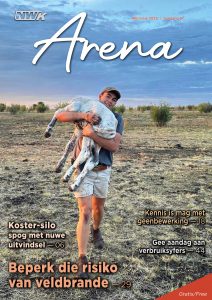
The presentation by John Sanei, a futures strategist, during Agri SA’s virtual congress on 14 October, was quite literally unbelievable. The theme of his talk was Trans-for-motion and John explained that we are transforming at a hyper pace towards an unknown future.
Imagine a world where you are in Lichtenburg and your wife in Cape Town. Unable to physically be together because of work commitments, but desperate to spend some quality time together, you both put on an avatar system that consists of a suit, goggles, speakers and a microphone… and together you stroll down a road in Paris, on your way to see the Eiffel Tower.
You literally see the same things, hear the same things. At this stage, you won’t be able to enjoy a latte and croissant together at a patisserie in France, but that might very well be a possibility in the near future.
Transformation
He spoke about transformation, adding that we are currently in the largest transformation of our lifetime. “It is scary, making us unnerved and frustrated as a society. We are addicted to certainty and outcomes. Our brains like predictability and we always look for safety and security.”
According to John, transformation consists of three stages:
- Sadness: “This is what we are going through at the moment as we are moving away from familiarity and comfort zones.”
- Strangeness: “Think of new words like multiverse. It will change every touchpoint of our reality and confuse us as they don’t really make sense.”
- Adventure: “We aren’t quite there yet, because we need to build momentum into the new world in order to believe and have the adventure.”
John continued, “We are currently in a state of crisis of meaning. We go to a university to study, follow a certain career to get comfort from, marry a person to create certainties, but this is a problem in the world we live in today, as it has no guarantees.”
The unknown future
According to John, our addiction to certainty is not serving us as a society anymore as we move into this unknown future. We are trying to hold onto the past and are poor in reimagination.
He elaborated on the three cycles humanity have gone through over the past few centuries to allow a better understanding of where we are headed.
FIRST CYCLE
This cycle consisted of three stages:
- Agricultural – which occurred about 300 years ago. The most important concepts during this time was to understand the different seasons, soil and crops. Physical strength was more important than intelligence.
- Industrial – during this time (the past 200 years) we needed to be educated in intelligence.
- Quantum or digital – this is also still ongoing. Left-brain, logical intelligence is being replaced by machines. During this phase, we have to utilise curiosity and excitement. This is very difficult for us as we haven’t been taught to do this.
SECOND CYCLE
This allures to the waves of business flow around the world. Where do we focus the flow of business to become as successful as possible?
Fifty years ago the big buzz word was globalisation, entailing the creation of collaborations and partnerships to bring about efficiencies and economies of scale.
Twenty years ago we started with digitisation, which now is at the heart of every business around the world.
“The new flow is dispersion. We are dispersing away from all focal points that we once used to congregate at, like universities, restaurants and shopping malls. Business are asking themselves how they can serve more people in their own spaces.”
THIRD CYCLE
This is based on the book The fourth turning: An American Prophecy, written in 1996 by William Strauss and Neil Howe. These authors described four turnings or seasons, and its accuracy, even today, is chilling.
They came up with the idea of generational archetypes and humanity goes through a saeculum (cycle of change) every 80 to 100 years.
“At the start of each turning, people change how they feel about themselves, the culture, the nation and the future,” John explained.
These four seasons include:
- Spring (new): 1946 to 1964. It was an upbeat era after the Second World War during which institutions were strengthened and individualism weakened.
- Summer (awakening): 1964 to 1984. This was a passionate era of spiritual upheaval during which civic order came under attack from a new values regime. Computers were also launched during this time, providing a new way to communicate.
- Autumn (unravelling): 1984 to 2008. Contrary to Spring, individualism was strengthened during this time and institutions weakened. Think of events like the fall of the Berlin wall, as well as the September 11 terrorist attacks.
- Winter (crisis): 2008, scheduled to continue until 2028. This is when a financial crisis started and the house of cards that socio-economic systems were built on, imploded. “Half of the population around the world wants to hold onto the good old days, but the other half is trying to move forward,” John said. The authors predicted a major war during this time, which John believes is COVID-19. “We have lost close to 5 million people to a common enemy attacking everybody. Massive job losses and unemployment due to the financial crisis and automation were also predicted,” John explained. This has resulted in a crisis of meaning, as everything we once trusted, has become untrustworthy. “Education used to guarantee a career, but it doesn’t anymore,” John said as an example.
“We should be resilient. However, if we don’t utilise it correctly, it can actually be a trap that stops us from evolving. Resilience entails responding, recovering and reimagining. However, we usually only respond and recover and then we stop. This poverty in imagining what could be next, is holding us back,” John warned.
He continued by explaining that we find complicated and complex business models and that ideally, these two should work parallel along one another in order to keep yesterday alive, while exploring tomorrow.
Complicated business models are characterised by:
- Patterns that repeat themselves.
- “You cannot ask the same teams to be innovative (improving existing measures) and disruptive (coming up with new ones).
- Can be solved using Maths and Accounting.
- It’s eventually automated.
- Economics of scale and efficiency are key.
These skills become irrelevant in a complex world, which is characterised by:
- The same patterns, but these are not repeated.
- Cannot be solved using Maths and Accounting.
- Requires complex technology, not yet developed.
- Economics of learning and robustness are key. “How quickly can you unlearn to relearn? That will be your superpower in the future.” John also quoted Alan Watts: “The knowledgeable man has to learn something new every day, but the wise man has to unlearn something new every day.”
He added that a “just in time” approach is perfect for a complicated world, whilst a “just in case” is the approach needed for a complicated world.
According to John, the world is ruled mostly by experts in yesterday’s world, not wanting to hand over decision-making power to those reimagining the future. Again, he quoted Herman Kahn: “The more expert or educated a person is, the less likely that person is to see a solution when it is not within the framework in which he or she was taught to think.”
He referred to Japan Airlines – a business that has realised that the future of travel isn’t always going to be about plains. It has set up a $70 million fund to partner with start-ups to help them understand what the future of travel could be.
“This has resulted in an incredible concept – Limitless Travel Avatar – focusing on the development of an avatar system that will transport a human’s senses, actions and presence to a remote location in real-time, leading to a more connected world.”
A ‘new approach’ business plan
John advises businesses to have “today” and “tomorrow” teams working parallel to one another. The differences between their approaches include:
TODAY
- A one to two-year focus
- Team members focus on profitability, old business models and are experts of yesterday.
- They are innovators and merely improve on old methods.
TOMORROW
- Team members have a two to five-year focus
- Team members learn, experiment and formulate new business models
- They disrupt, by coming up with entirely new concepts
“You can respond to and recover from a crisis as well as reimagine the world we are moving towards. Every successful person has two beliefs: that tomorrow will be better and I have the power to make it so. The ones who spend time reimagining the new future, are the ones who will thrive,” he concluded.









